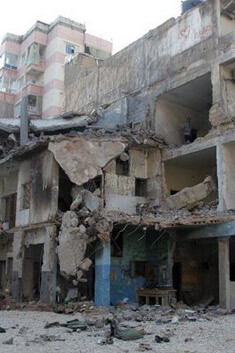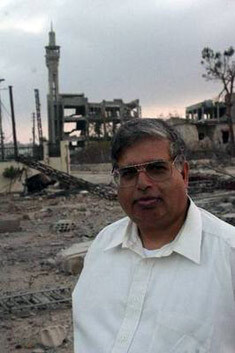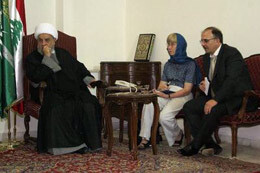United for Lebanon 11 September 2006

Dr Phyllis Starkey MP in south Lebanon (United for Lebanon/The August Lebanon Project)
The team assessed, in particular, the extent of destruction and displacement following heavy Israeli bombardment, especially of the southern suburbs of Beirut and towns and villages in the south. They also identified areas of urgent humanitarian need following meetings with officials. The team will report their findings to the British Houses of Parliament, the European Parliament, and the United Nations, as well as to the international media and the European and American public.
The delegation consisted of nine members: Dr Phyllis Starkey MP (Milton Keynes, South-West); Khurshid Ahmed (British Muslim Forum); Dr Ismail Farhat (Muslim Association of Britain); Dr Hussein Gharbieh (The Lebanese University); Nadeem Kazmi (Al-Khoei Foundation); Kassam Manji (Khoja Shi’a Islamic Centre, Stanmore); Dr Essam Mustafa (Interpal); J R Ramirez (official photographer); and Ahmed Versi (The Muslim News)
According to Dr Starkey, “The opportunity to talk to a wide variety of groups [was] particularly valuable in assessing the political temperature in Lebanon and the way the British Government can be most helpful in supporting the Lebanese people and their Government.”

Destruction in south Beirut (United for Lebanon/The August Lebanon Project)

Kurshid Ahmed in Khiam (United for Lebanon/The August Lebanon Project)
The team travelled to selected locations throughout the country, including Beirut, Sidon, Nabatiyeh and Khiam. Among the senior officials they met with were President Emile Lahoud; Foreign Minister Fawzi Khalloul; former minister and representative of the Speaker of Parliament, Yasin Jabar MP; Sunni Grand Mufti Shaykh Muhammad Rashid Kabbani; Deputy Chairman of the Shi’a Higher Council, Shaykh Abed al-Amir Qabalan; and Britain’s ambassador, James Watt.
The delegation saw first-hand the extent of the humanitarian crisis in Lebanon and concluded, among other things, that it is absolutely essential that the Israeli air, land and sea blockade is lifted immediately as this is not only preventing urgent humanitarian supplies reaching the vulnerable populations but is crippling Lebanon economically. Military strikes on Lebanon’s civilian infrastructure have adversely affected ports, grain silos, bridges, roads, and factories. Widespread damage to fuel containers and service stations has, moreover, raised the likelihood of severe fuel shortages. A continuation of the blockade can only lead to political instability and further destruction of the fragile social infrastructure. The delegation calls on the international community to force the immediate lifting of this disastrous blockade which blatantly contravenes UN Security Council Resolution 1701.

Meeting with Shi’a Higher council (United for Lebanon/The August Lebanon Project)
In condemning the disproportionality of Israeli air-strikes on civilian infrastructures in Lebanon and calling for an immediate lifting of the blockade, the delegation emphasizes that there should be no restrictions or prohibitions on the movement of international personnel, including humanitarian and medical personnel, monitors and journalists. Moreover, the task of reconstruction of physical and institutional damage to infrastructure should begin immediately with international assistance.
The delegation believes that the continuing situation in Palestine also needs to be monitored closely in relation to Lebanon and urges the British Government to admonish Israel for its disproportionate bombardment of the country, particularly the destruction of civilian infrastructures.
Finally, the delegation was both impressed and humbled by the clear resolve of the people of Lebanon to rebuild their country in the aftermath of the devastation, and in particular recognizes the overwhelming sense of solidarity and cohesion across the diverse spectrum of Lebanese society, all of whom have been affected by the conflict and who stand in unity in the aftermath of such awesome destructiveness. The delegation therefore expressed its sympathies with all the people of Lebanon as well as the frustration of many people in Britain and elsewhere who wish to help alleviate, in constructive ways, any further suffering.
Related Links